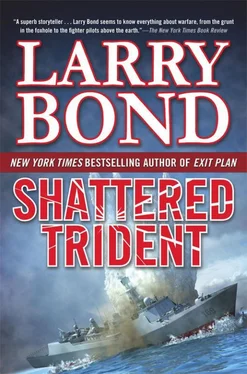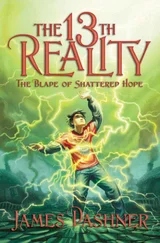His official escort, Commander Nimh, had chatted with the professor in English, since Komamura spoke little Vietnamese. Nimh had read the new Vietnamese translation of Komamura’s book, and was obviously enthused to meet its author. Nimh made it clear that he considered the assignment a privilege, and that there had been fierce competition for the spot.
They were close to the ministry now. It occupied an entire block of Hanoi, but looked more like a college campus than office buildings or a military headquarters. Light-colored brick buildings with red roofs surrounded a grassy quadrangle with a fountain in the center. Trees dotted the grassy areas and almost surrounded the ministry buildings.
They turned out of the morning traffic and stopped at the security gate. In spite of the official car, the driver and Commander Nimh both had to present their identification. The commander showed a letter vouching for Komamura, and the guards checked him against their own access list.
There were more security checkpoints after they entered the main building and went to the top floor. As in other military headquarters he’d visited, Komamura passed relics in glass cases, paintings of battles, and several images of Ho Chi Minh and General Vo Nguyen Giap. At the last checkpoint, he surrendered his smartphone.
Komamura was nervous; he’d been treated like royalty, and had enjoyed every minute of it. But there comes a time when royalty has to earn its keep. Normally he didn’t pay much attention to his appearance, but he’d dressed for the occasion in his best suit with a wave-patterned dark blue silk tie embroidered with the kanji character for “ umi, ” the sea.
Nimh led him to a top-floor conference room. Instead of a large table, there were several groups of comfortable-looking chairs. Occupying three were several older naval officers. Preparing for the trip, Komamura had studied Vietnamese rank insignia. These were senior admirals.
A junior officer stepped up to translate, and the professor was quickly introduced to Admiral Hieu, the navy’s chief of staff, and Admirals Phai and Duan, the heads of the Vietnamese Navy’s political and intelligence directorates. He realized they’d all been at his lecture yesterday, but they hadn’t been introduced to him at that time.
While Nimh served small cups of tea, Komamura took a seat next to the chief of staff. The admiral was old enough to have a puckered scar on his left arm that ran up under his shirtsleeve. Komamura had heard he’d been wounded in the south. He hadn’t heard how.
Komamura was only slightly younger than the admirals, but his expensive suit contrasted sharply with their dark green uniforms. He was also nearly six feet tall, a full head higher than Admiral Hieu and the others. Komamura’s large frame filled his chair, and his Buddha-like bulge would never have been tolerated in military service. Their only similarity was a lack of hair. Komamura had a fringe of white, Phai’s was thin to the point of transparency, while the other two had simply shaved their scalps.
“Admiral Kubo sends his best wishes,” Komamura said. “I spoke with him just before leaving Japan. He remembers your meeting in Honolulu warmly.”
“At the Pacific defense chiefs’ conference,” Hieu remembered. “Our first discussions there were most helpful.”
Once Nimh had made sure everyone was settled, he disappeared, leaving Komamura with the three admirals and the translator. The professor knew he faced his examiners.
Admiral Phai, the head of the political directorate, began the conversation. “The new Vietnamese translation of Navies for Asia has been very well received here. It was even reviewed in Quan Noi Nhan Dan, a mainstream newspaper, although the reviewer criticized it for being ‘pro-Chinese.’”
Komamura laughed, almost a chuckle. “That’s what he gets for not reading carefully. Recognizing the growth of Chinese military power doesn’t mean I support that growth.”
“We agree with you that the Chinese threat is only going to get worse,” Phai responded. “Every country bordering the South China Sea has suffered attacks on their exploration ships, unauthorized fishing in their waters, and confrontations with Chinese paramilitary vessels. The number of these incidents is growing, and China makes no apologies.”
Hieu asked, “Have other navies besides Japan and Vietnam shown interest in your book?”
“I’ve lectured in America, and received e-mails from almost every littoral nation. Many are from naval officers. I’ve had to hire a secretary. I will be visiting the Republic of Korea almost as soon as my trip here is finished, and a little later, India.”
“Why did you choose naval strategy for your latest work?” This came from Admiral Duan, head of the Second General Department, the armed forces’ intelligence branch. “You teach economics at Tokyo University. Your earlier books have been about economics or history.”
Komamura nodded. “True, but it’s impossible to separate economics from politics, or politics from war. My latest book began as an analysis of China’s rapid economic growth in the new century, but that massive growth demands resources, especially energy and food.” He shrugged. “China has always been hungry, but now her hunger drives her to the sea. I decided to share my conclusions.”
Duan continued, “You are a member of the New Renaissance Party, which promotes a strong military and reverence for the emperor. Isn’t your book just a reflection of your political beliefs?”
The professor shook his head, disagreeing. “My political beliefs are rather a reflection of my research.” Komamura began ticking off points on his fingers. In Japanese fashion, he raised his little finger first.
“First, Chinese economic growth requires far more resources than they have. They see those resources close at hand, in the South China Sea. The rapid growth is masking artificialities and serious flaws in the Chinese economy. If their economy slows too much, and it is slowing, it will likely collapse.
“Second, in pursuit of those resources, China is transforming her navy from a coastal defense force to a blue-water regional power. This is a clear signal of their intentions.
“Third, U.S. military power in this part of the world is waning. They are still paying the bill for two long wars, and force modernization has suffered. There are also questions about their political will. China is America’s second biggest export customer, as well as her greatest importer. Furthermore, China is the largest holder of U.S. debt. I submit that we cannot depend on a distant, weary America to counterbalance nearby Chinese military power.”
Komamura finished, “I joined the New Renaissance Party three years ago, and hope to advise them on economic and security issues.”
Admiral Hieu had listened as Komamura made his arguments. “There are nations that would not be happy to see a stronger Japan, not only free of American support, but unrestrained by any obligations to America.” Komamura knew that Vietnam had been occupied by Japan during the Second World War, although they had not suffered as badly as Korea or the Philippines.
“I do not advocate becoming stronger individually, but rather increasing our strength through alliances independent of U.S. interests, which may not be the same as our own. And what drove Japanese aggression during the Pacific War?” Komamura asked pointedly. “Demand for resources to support her rapid industrialization. Japan’s military leadership in 1941 was filled with a sense of their own manifest destiny. I believe China’s leaders are driven not only by national pride, but also fear. If their economy falters, they risk losing power. If it collapses, the nation could go with it. For the Chinese leadership, aggression in the South China Sea presents fewer risks.”
Читать дальше

![Никки Сикс - Героиновые дневники. Год из жизни павшей рок-звезды[The Heroin Diaries - A Year in the Life of a Shattered Rock Star]](/books/78612/nikki-siks-geroinovye-dnevniki-god-iz-zhizni-pavshej-rok-zvezdy-the-heroin-diaries-a-yea-thumb.webp)










